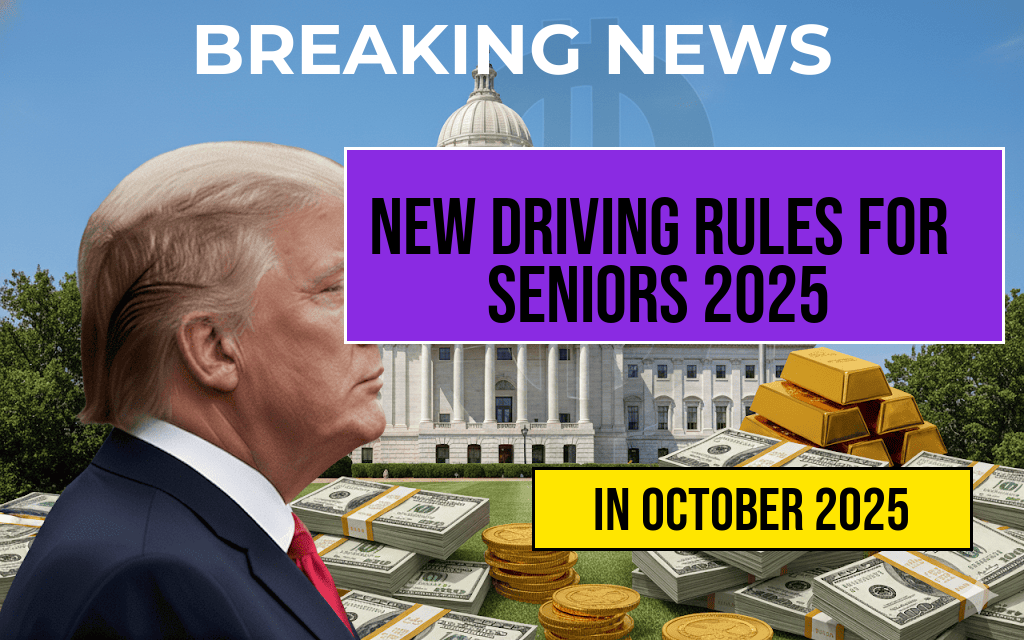The U.S. Department of Motor Vehicles (DMV) announced new driving license requirements for drivers aged 70 and older, set to take effect in October 2025. These changes aim to enhance road safety by ensuring older drivers maintain the necessary skills and health standards to operate vehicles responsibly. Starting next fall, seniors will face more rigorous testing protocols, including mandatory vision assessments, increased frequency of license renewals, and optional driving evaluations. State agencies are also exploring ways to incorporate advanced technology, such as virtual driving simulations, to better assess older drivers’ capabilities. These updates come amid ongoing discussions about balancing individual mobility with public safety, as the demographic shift toward an aging population prompts policymakers to rethink existing licensing procedures. The new regulations are expected to impact millions of senior drivers across the country, emphasizing the importance of proactive measures to prevent accidents while respecting the independence of older Americans.
Key Changes in Licensing Procedures for Seniors
Mandatory Vision and Health Screenings
- Vision Tests: All drivers aged 70 and older will be required to pass a standardized vision screening at every renewal. The test will assess visual acuity, peripheral vision, and depth perception.
- Health Declarations: Applicants will need to submit a health declaration form, attesting to their physical and mental fitness to drive. Some states may require a physician’s certification if concerns arise.
Increased Renewal Frequency and Flexibility
- Renewal Intervals: Instead of the typical renewal every 8 years, drivers aged 70+ will need to renew their licenses every 4 years, with options for more frequent updates if necessary.
- Early Renewal Options: Seniors can opt for early renewal if they experience changes in health or vision, allowing proactive assessments before the standard renewal date.
Driving Evaluations and Support Tools
- On-Road Driving Tests: Some states will introduce optional, behind-the-wheel evaluations to assess practical driving skills, especially for those with medical conditions.
- Virtual Simulations: Emerging pilot programs will incorporate virtual driving scenarios to evaluate reaction times, decision-making, and hazard recognition in a controlled environment.
Implementation Timeline and State Variations
| State | Effective Date | Notable Changes |
|---|---|---|
| California | October 2025 | Mandatory vision tests; health declarations required |
| New York | January 2026 | Introduction of optional driving evaluations |
| Texas | October 2025 | Increased renewal frequency; health screenings |
States are tailoring these policies according to their specific needs; some are adopting more stringent measures, while others are implementing pilot programs to evaluate effectiveness. The federal government encourages states to collaborate with healthcare providers and technology companies to develop comprehensive assessment tools.
Impact on Senior Drivers and the Road Ahead
Balancing Safety and Independence
Advocates emphasize that the new requirements are designed to protect both senior drivers and the general public without unduly restricting mobility. Many seniors rely on driving for daily activities, including healthcare visits, grocery shopping, and social engagement. Authorities stress that the goal is not to limit independence but to identify and address potential risks early through supportive measures.
Support Systems and Resources
- Driver Refresher Courses: States will promote access to educational programs aimed at older drivers, focusing on changes in traffic laws and safe driving techniques.
- Medical Consultation Services: Increased collaboration with healthcare professionals will help determine fitness to drive, especially for those with chronic conditions.
- Alternative Transportation: Communities are encouraged to expand transportation options for seniors who may need to limit their driving activities.
Expert Perspectives and Public Response
Transportation safety experts acknowledge that while the new regulations may initially pose some inconvenience, they are a proactive step toward reducing accidents involving older drivers. A recent study from the Wikipedia article on older adults highlights that age-related declines in vision, reaction time, and cognitive function can impact driving ability. Public reaction remains mixed, with many seniors expressing understanding of the safety rationale but concerns about increased testing burdens.
Looking Forward
The upcoming policy changes are part of a broader effort to adapt transportation systems to demographic trends. As the population of Americans aged 70 and older continues to grow, these measures aim to foster safer roads while respecting individual rights. Policymakers and advocacy groups continue to monitor the effectiveness of these initiatives, with ongoing discussions about integrating emerging technologies such as autonomous vehicles and advanced driver-assistance systems to further support safe mobility for seniors.
For more information on state-specific requirements and resources, seniors and their families are encouraged to consult official DMV websites and local transportation authorities.
Frequently Asked Questions
What are the new driving license requirements for seniors starting October 2025?
Beginning October 2025, drivers aged 70 and older will need to fulfill updated renewal procedures, including additional vision tests and medical evaluations to ensure they are fit to drive.
Who is affected by the new driving license requirements?
The new requirements specifically target seniors aged 70 years and older who hold or wish to obtain a driver’s license in the United States.
What documents are needed to comply with the new licensing process?
Applicants will need to provide proof of identity, medical documentation confirming fitness to drive, and may be asked to undergo vision and health assessments.
Will there be any exemptions or special considerations for seniors with health issues?
Yes, seniors with medical conditions that may impair driving ability can apply for special permits or additional evaluations, and in some cases, may be required to submit medical reports for license renewal.
How can seniors prepare for the new requirements to ensure a smooth renewal process?
Seniors should schedule vision and health check-ups in advance, gather all necessary medical documentation, and stay informed about renewal deadlines to comply with the new regulations starting October 2025.










